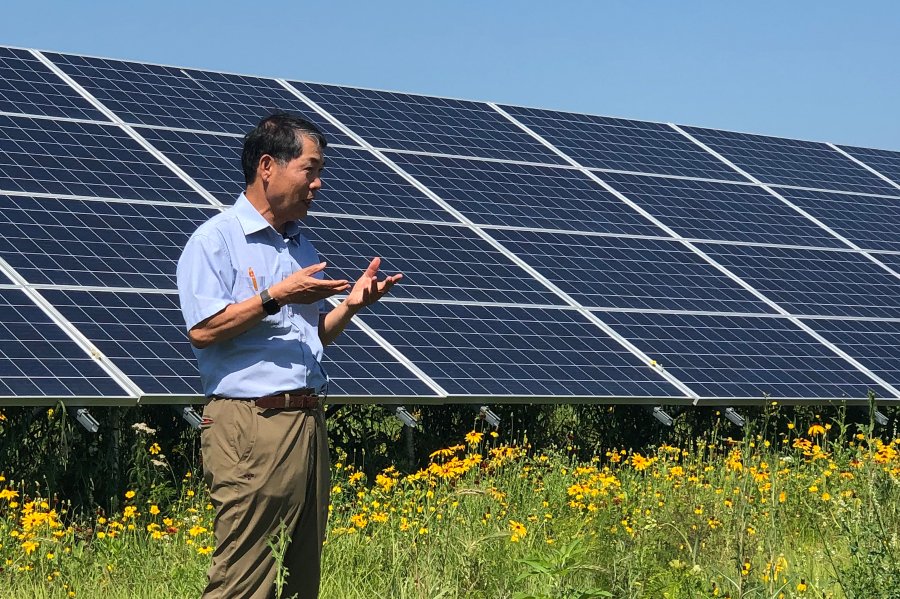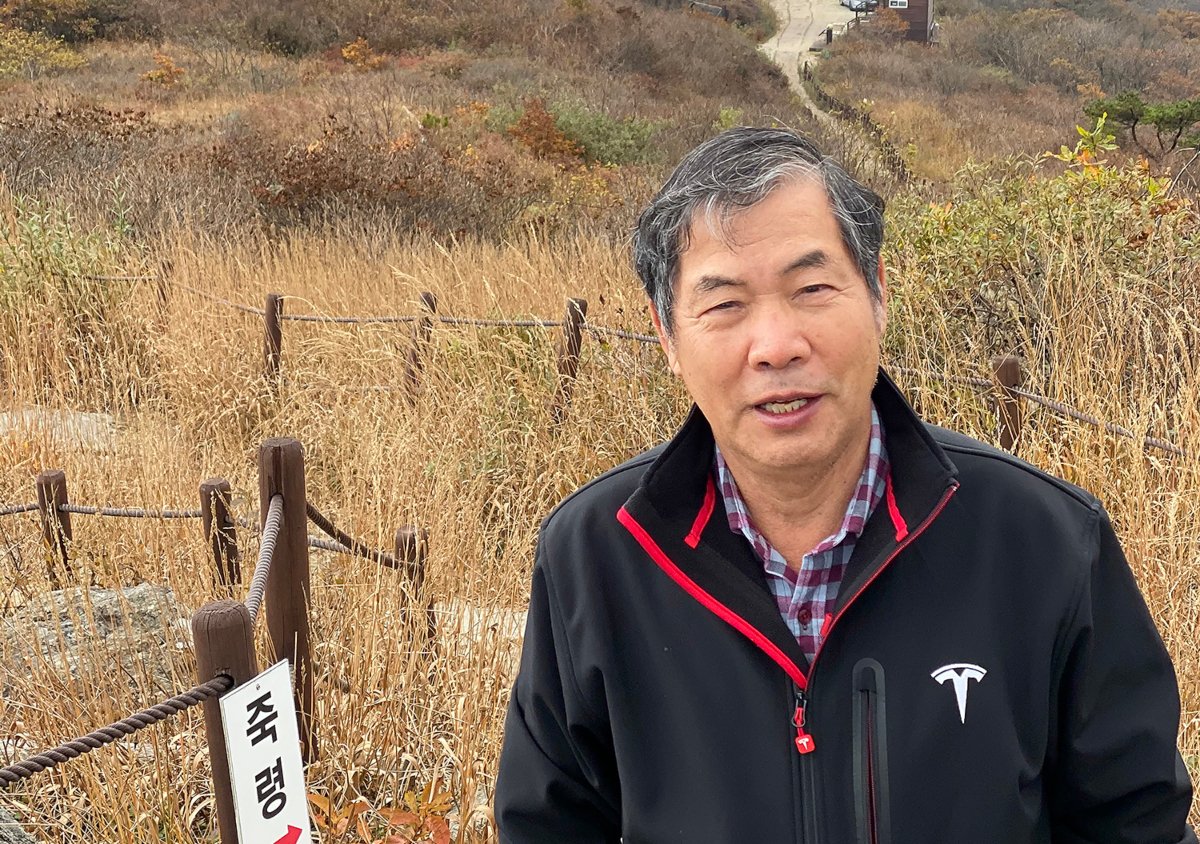In Hard Times, Hope and Persevere

DENNIS KIM has a message for engineers coming of age in the covid-19 pandemic: Do not give up hope.
Dennis Kim sees hope as two-pronged: To persevere through hard times one must acknowledge the reality of the situation and simultaneously hold on to hope that things will get better. One must not get overly optimistic to the point of dismissing challenges.
Hope in the face of change
Kim’s journey to Minnesota began way back, when the US and Korea signed a truce in 1953. Seoul National University (SNU) and the University of Minnesota (UMN) entered into an educational partnership for studies in medicine, engineering, and agriculture. This partnership opened the door for many students from SNU to study at UMN.
[Read more ‘Sister Relationship’: Cooperative Project with Seoul National University. From the Archivist: Occasional posts related to University history (May 15, 2020).]
Kim came to UMN in 1969 after finishing his military service. His plan was to study aeronautical engineering. “My goal since junior high school had been to become a professor at SNU. I finished my Master’s degree in 1971, passed the preliminary exams for a Ph.D., and then things changed. That was the year funding for supersonic transports (SSTs) was cut.”
The US had been spending billions to build SSTs, creating a large industry for companies like Boeing. When federal funding dried up, many jobs were lost at Boeing and projects and programs at universities, including UMN, were cut. An infamous billboard near the Seattle-Tacoma airport read, “Will the last person leaving SEATTLE — Turn out the lights.” The change was sudden, and one over which Kim had no control. Kim lost his aeronautical engineering scholarship. The situation looked bleak.
Searching for another source for funding, Kim explored related fields: “Aeronautical engineering involves fluid mechanics using air; fluid mechanics in civil engineering involves water. There are common themes.” Turning down offers elsewhere, Kim decided to stay in Minnesota and study civil engineering with Professor Ed Bowers. “He was exceptional! He was friendly and willing to work with students. He taught me so much.”
“An unforeseen consequence of changing my major was that I lost some of my connections in Korea. I did not know anyone in the SNU civil engineering department. My adviser in Korea wanted me to come back and work with him; however, I did not want to teach aeronautical engineering after studying civil engineering. So I decided to stay in the US.”
Changes in industry and government spending jolted Kim’s career off his planned path. “That was a tough time for me,” says Kim, “but looking back, what a blessing! For students now facing changes because of COVID-19, I say, don’t give up; your career may go in unexpected ways and you can still be happy!”
Hope in the face of a pandemic
Kim’s company, EVS Inc., like many others, was forced to make changes due to the COVID-19 pandemic and the resulting stay-at-home orders. One month in, EVS experienced project delays and some cancellations. The future was definitely uncertain. Kim sat down with his son Andy, now the Chair and CEO at EVS, to figure out what to do.
EVS puts great value on their employees. Dennis Kim acknowledges, “My desire to move into the field of renewable energy would have been just a vision without the exceptional staff we have, and I am really thankful for them. We knew we had to take care of our employees. Our clients keep coming back with bigger and bigger projects because everyone at EVS respects them. We do not claim to be the best in the country, we don’t say that. We just do the work. That is who we are.”
So, Dennis and Andy Kim redefined success for 2020 in terms of people. Dennis Kim: “EVS has been around over 40 years, and we have had some very prosperous years recently, but we needed to redefine success for 2020. I said, ‘We need to take care of our people, and they will take care of our clients.’ We thought if we could get through this pandemic without laying off employees that would be success for this year.”
The Kim’s base their business on values of humility, integrity, and respect. That focus on values draws good employees to the company, even in times of pandemic. Solar engineer Conner Boyle started working at EVS in July 2020. Boyle previously worked for Cypress Energy, a very large entity in construction of solar energy facilities. Solar energy engineers are a hot commodity now, so when Cyprus Energy closed down their civil engineering group, Boyle found himself courted by many companies. Boyle had seen an article about EVS from the Minneapolis Star Tribune (March 15, 2020). Boyle told Kim, “Your talk about humility, respect, and integrity is the reason I chose EVS. This is the kind of company I want to work with.” The respectful culture Kim has cultivated over the decades and EVS’s experience with renewable energy set this company apart.
A few months after the stay-at-home orders, clients and projects started coming back. As of July, EVS had hired five people, and they anticipate adding more. EVS is expecting a successful second half in 2020.
Kim learned to get through hard times by being both practical and hopeful. One source from which Kim draws strength and inspiration is the story of James Bond Stockdale, a US naval officer who was a prisoner of war for over seven years. Commander Stockdale saw many fellow prisoners die because they lost hope. Stockdale’s approach was realistic; he acknowledged there was no foreseeable end to his current misery and prepared himself to face a long, hard ordeal. Simultaneously, Stockdale held a vision that someday he would be able to go home.
Stockdale’s story resonates with Kim, “When I go through hard times, I want to be optimistic, but I must also be prepared for things to be bad for a long time. I hold onto the idea that there is something beyond this bad time.”
To young engineers in this challenging time, Kim says, “Do not lose hope! There are firms who are doing OK, putting people first, and giving engineers opportunities. A lot of young people go through tough times, maybe when there are no jobs. My lesson is do not stay stuck, do not give up hope!”
Hope for the future
EVS designs solar energy projects, and that market is expected to double or triple in size. Yet Kim’s optimism has a broader scope. “When I think about the future,” says Kim, “I get really excited. The opportunities go beyond what we can even imagine!”
Some of the trends EVS is watching and planning for include microgrids, energy analytics, and electric vehicles.
Microgrids. A microgrid power system is small; it works on its own and is connected to a larger power grid. One advantage is that individual smaller grids or sections can keep working if one or two go down. When hurricane Maria hit Puerto Rico, the whole island lost power for a long time. The power system was rebuilt using a microgrid including batteries, solar, etc. Kim predicts that microgrids will change the way we use energy.
Energy analytics. Energy analytics involves gathering data about energy production, use patterns, and available sources. That data can be analyzed to make informed choices about energy use, movement, storage, and prices.
Electric vehicles. As more people drive electric vehicles, more infrastructure will be needed to serve the drivers. EVS is looking at EV infrastructure as a growth area.

Kim anticipates a long future for energy engineering and for EVS. “I feel fortunate to work with my son, Andy Kim. I know change will happen. I cannot go on forever. Older generations often try to keep things as they have been; younger generations need look to the future. Nothing survives without a vision for the future. At some point, the older generation has to let go, to train the new generation, so the company can continue to rise. Someday Andy will have his own transition, and I hope I have trained him well for that day.”
“There is so much opportunity for EVS and for the wider world of civil engineering. Civil engineering covers everything around us. As long as we live on earth—and even on Mars—we will need infrastructure. Students have so many directions available to them. It is a great field to be in!”
Kim has written a book about his life and finding purpose and satisfaction even after disappointment. The book was first published in Korean; Kim is currently translating it into English. Part of his book promotion involved travel to Korea and lectures in various universities. Through this experience, Kim was able to fulfill part of his dream to teach at a university in Korea. He told his first audience, students at his wife’s alma mater, Ewha Womans University, “I wanted to be a college professor and finally here I am!”
His lesson? Life takes unexpected turns. Don’t give up hope. Civil engineering is a field with a great future.